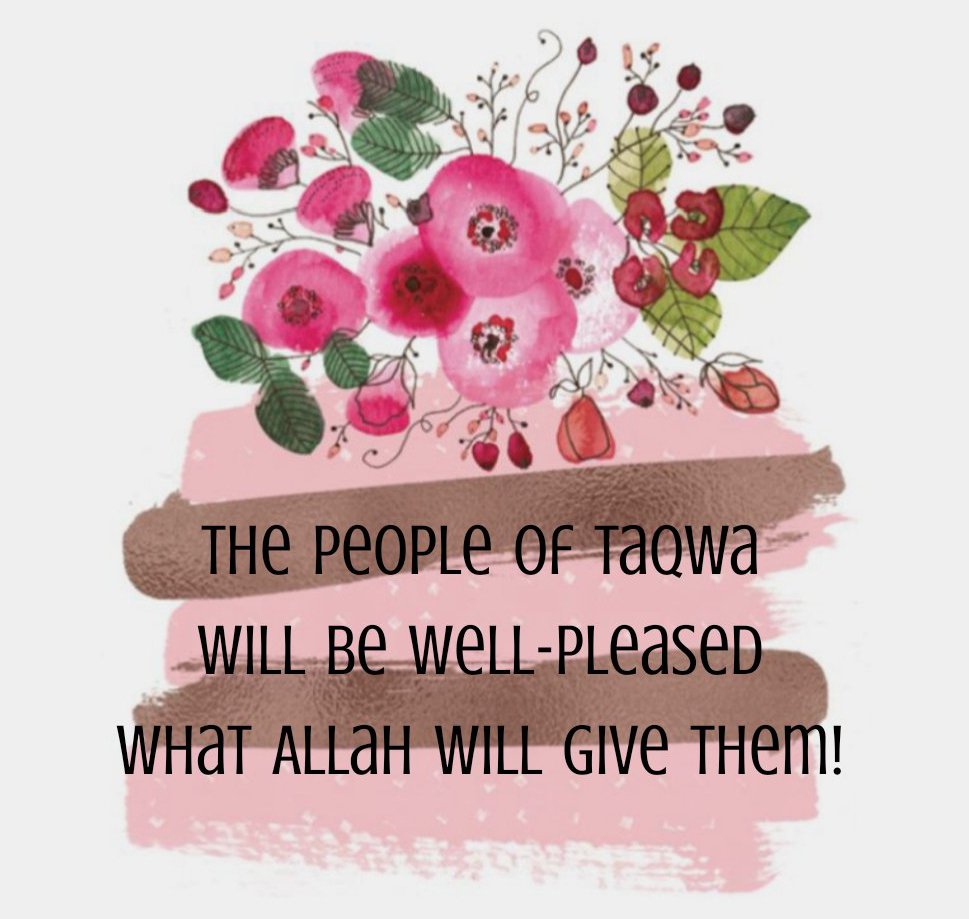
Surah Al-Lail is a Meccan Surah with twenty-one verses. Al-Lail means The Night. The Surah takes its name from the word wal-lail with which it opens.
Its subject matter so closely resembles that of Surah Ash-Shams that each Surah seems to be an explanation of the other. It is one and the same thing which has been explained in Surah Ash-Shams in one way and in this Surah in another. This indicates that both these Surahs were sent down in about the same period at Makkah.
Its theme is to distinguish between the two different ways of life and to explain the contrast between their ultimate ends and results.
The surah begins with a number of oaths and when an oath is taken you are being asked to reflect on each item within the oath and to prepare yourself for the response which is usually central to the entire surah. The fundamental lesson of this surah is that the efforts of man are truly diverse. Some are working hard towards righteousness and some are working hard towards being wretched and disobedient to Allah and these efforts and how Allah facilitates them are then described in detail. Reward and punishment in this life and the next are both owned by Allah and He warns of a fire that none will enter save the most wretched. Yet Allah also informs us how one can be saved. The most recurring theme in this surah is wealth and we learn in this surah that if you want to cleanse yourself it has much to do with your attitude towards wealth. There is nothing wrong with owning wealth but there is something wrong with the love of money entering one’s heart. Either you want to get wealthy in this world or the next. However, it is still possible to be wealthy in both if you are sincere to Allah and are striving for the next life more. When one concerns themselves with worldly things and it becomes a priority in their life and a priority over the next then they have turned away and are in danger of becoming one of the wretched ones.
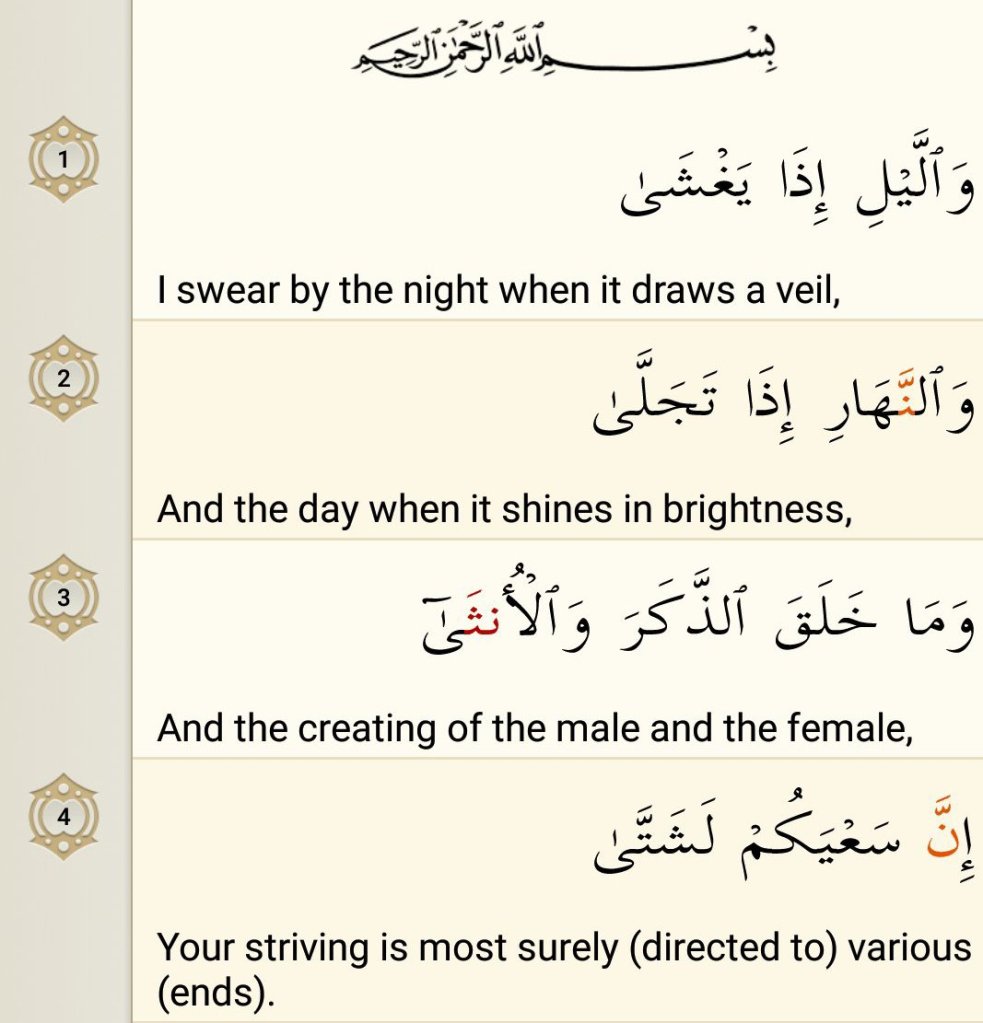
Allah takes oath by three things in the first three verses i.e. night, day, male & female, and diverts our attention that most surely the striving and efforts of man are in different directions. Just as the night and the day, and the male and the female, are different from each other, and their effects and results are mutually contradictory, so are the aims and objects for which men are endeavoring and struggling, are different in their nature and contradictory with regard to their results.
Enveloping Night…
Allah swears by the night as it covers up. The word yaghsha means to cover with darkness all that had light before. When Allah refers to the night He is alluding to disbelief and when he refers to the day he is alluding to revelation which like light gets rid of darkness.
Radiant Day…
It enforces the meaning that the day removes the darkness and makes everything bright and manifest immediately with nothing hidden, just like the divine revelation removes all the darkness of ignorance. Light that is the secret of the life of all living things. In the Quran, the contrast of ‘light’ and ‘darkness’ and their effect in Man’s life is repeatedly stated and emphasized upon, because they are two perpetual great blessings and are also two Divine Signs.
Creation of Male & Female…
The existence of the mystery of the sexes runs through all life in human beings, animals and plants. The process of development that occurs in the life-germ from the very beginning until the time of birth, the characteristics of both sexes due to their functions and actions, and the secrets hidden in the sex phenomena are all Signs of the glorious world of creation through which we may understand the greatness of its Creator. These pairs that are being mentioned have a profound lesson in them. Everything Allah created in pairs in this universe and balanced it, imagine if we only had night and no day, it would be damaging. There are signs for us to ponder through these oaths.
“The ways you take differ greatly…
Allah then enforces the main point that the concerns people are running towards, in both a religious and non-religious sense, are diverse and contradictory in the same way the night and the day and the male and the female are. In a religious sense for example, the Muslims are making efforts for the establishment of the deen and the non-Muslims are making efforts in the opposite direction to harm the teachings of the deen. In the dunya also everyone has different concerns, problems and responsibilities which push them in different directions.
People have different or diverse aims in life for which they strive. One might be talking of the pleasures of this world while another may be mindful of the life in the Hereafter. No one lives aimlessly, but we should be careful of the way in which we use our divine talents and powers in order to understand if it is for good or evil.
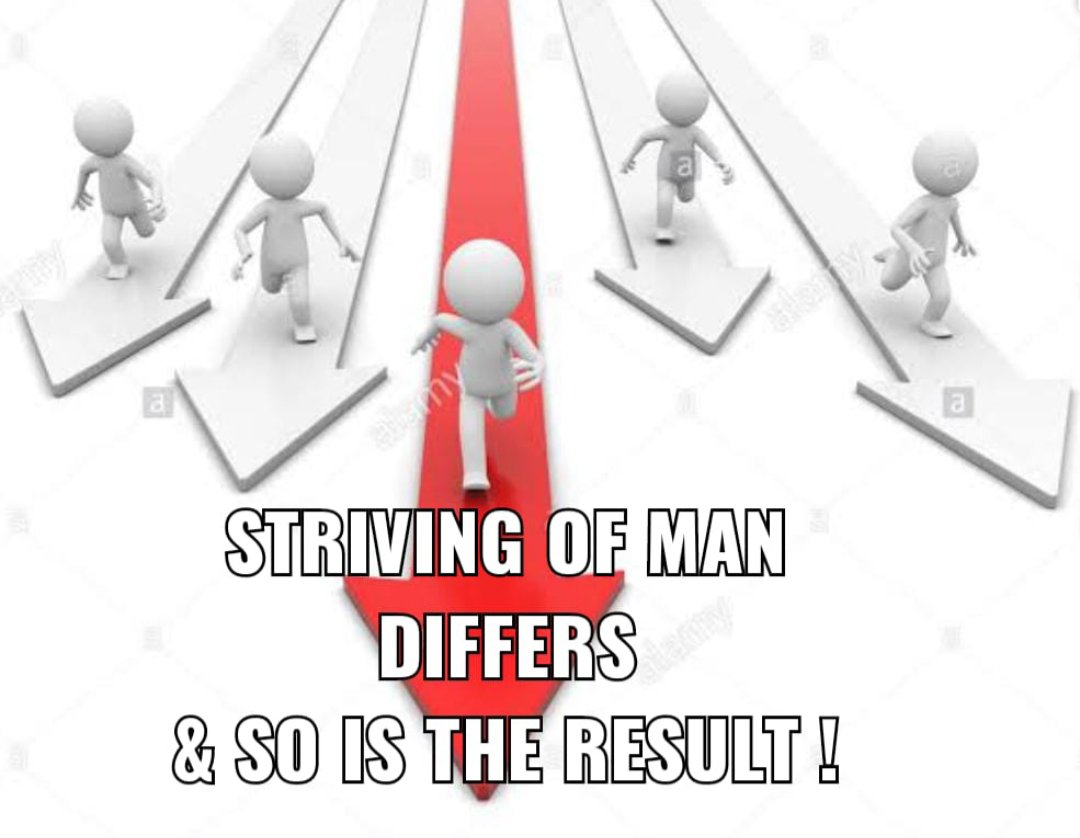
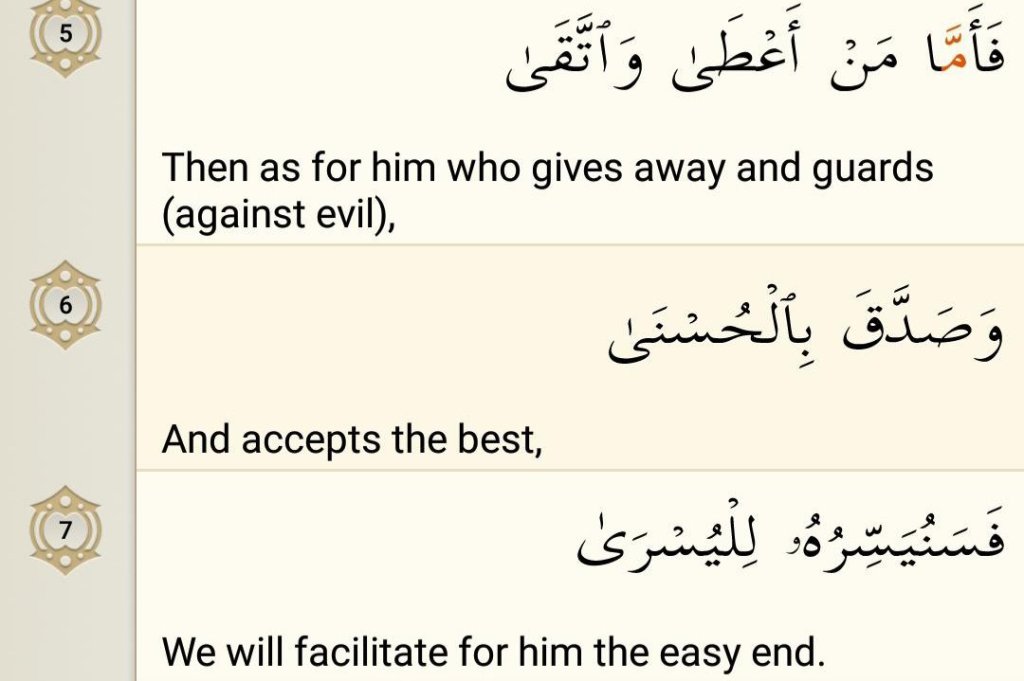
After saying that man strives in different directions, now the two main strivings Allah mentions. These verses address the first kind of endeavors, which includes three things, and which comprehend all virtues:
(1) That Man should refrain from wealth-worship, but should spend whatever Allah has given him generously for good works and for helping others;
(2) That he should fear God and refrain from things which cause His displeasure in any way & strive for max Taqwa;
(3) That he should believe in goodness. Goodness is a comprehensive word, which includes goodness of belief, morals and acts. Goodness of belief means following pure Tawheed. Affirming belief in goodness of morals and acts is that one should not be doing good merely unconsciously, outside a definite system, but one should acknowledge as right and sound the system of goodness which God has sent, which combines every kind of goodness in all its forms under the Divine Shariah.
Then the one who follows these guidelines, Allah will facilitate for him an easy end. The easy way implies the way which is in accordance with human nature, which is in accordance with the will of the Creator. It is a way in which man has not to fight his conscience, in which he does not have to force his mind and energies into doing works for which they were not created but to do things for which they have actually been made for!
When after affirming goodness man decides that this way alone suits him, and the evil way does not suit him, and when by making sacrifices and adopting the life of taqwa practically he proves that he is true in his affirmation, Allah will make easy for him to walk this way. Then, to commit evil will become difficult for him, and to do good easy. And ultimately the path is made smooth to Jannah also!
This same idea has been expressed in Surah An Nahl V:97,
“Whoever does righteous deeds whether male or female, provided that he is a believer, We will surely grant him to live a pure life in this world.”
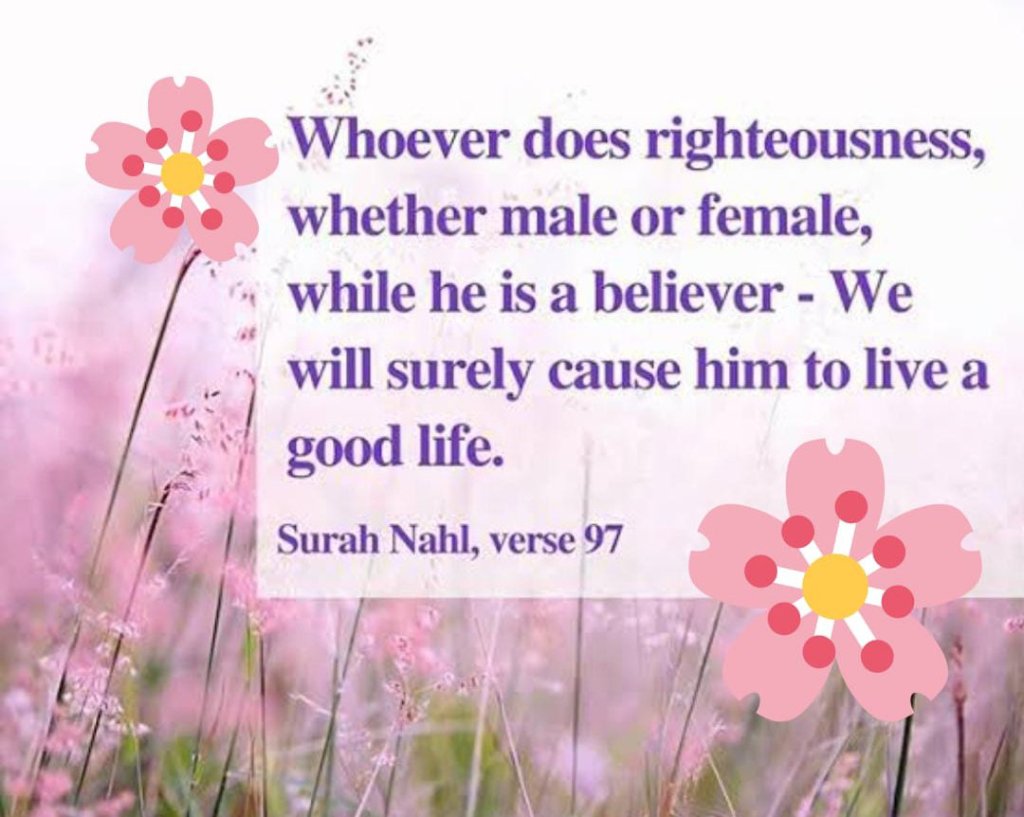
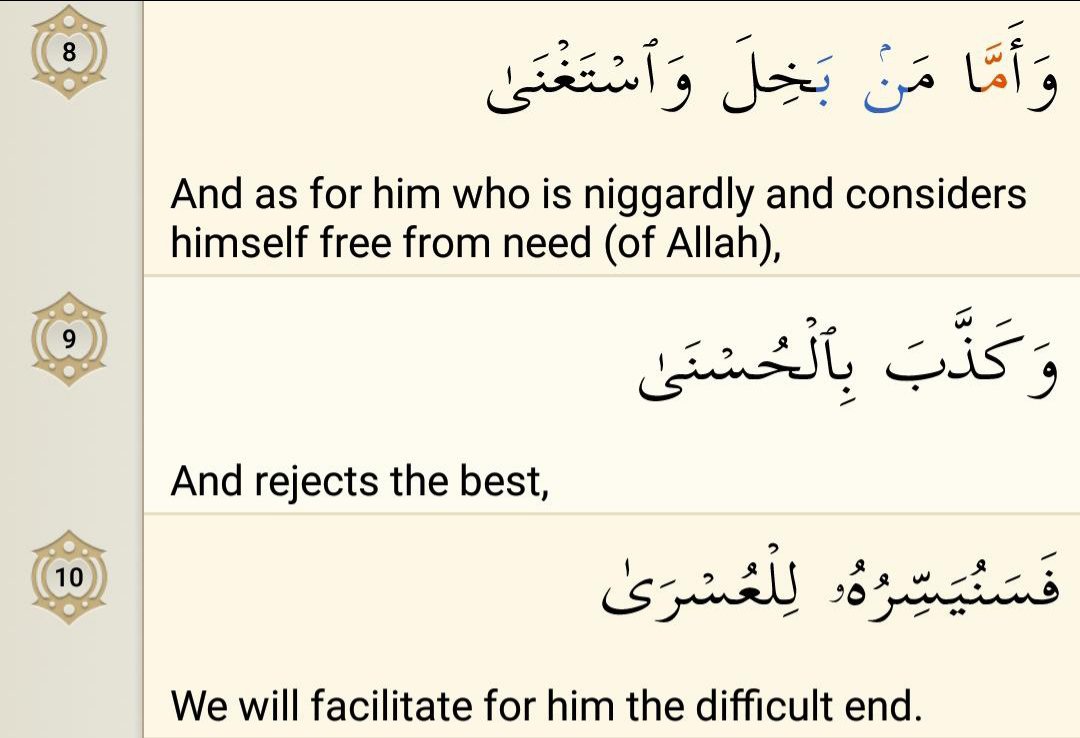
These verses now talk about the second type of group whose efforts are in opposite direction to the former group. Such a person is miserly and feels himself free of need of God, he feels himself self sufficient. This is a person who does not spend any money in the path of Allah or any of the pathways of good and this implies that there were many opportunities to do good which were not taken advantage of. This person was reluctant to invest in any of the rewards of the hereafter and when others choose to invest in the hereafter he advises them to save their money for a rainy day. He would spend wealth on perosnal uses, in all kinds of evil but not in path of Allah.
Such a person would deny the ultimate good. As a result of this person’s arrogant attitude he feels empowered and independent enough to deny Islam and goodness. He thinks through his arrogance that the religion should suit his desires and that he does not need to submit to religious commands and principles. When he says the religion should be adapted to suit him, he is lying against goodness and the ultimate good of Islam.
As a result of all these negative traits Allah will make the evil deeds easy for this person. This way has been called the hard way, for although the one who follows it, does so for the sake of material benefits, worldly enjoyments and superficial successes, yet while following it he is always at war with his nature, his conscience, the laws of Allah. He will be deprived of the grace to follow the way of good, gates of evil will be opened up for him, means and resources for the same will be provided for him, doing evil will become easy, and doing good will become toilsome and risky for him, and ultimately the path is made smooth for Hell.
“So whomever Allah wills to guide aright, He makes his breast wide open to Islam, and whomever He wills to let go astray, he makes his breast narrow and squeezes it so tightly that ( at the very idea of Islam) he begins to feel as though his soul were climbing up towards the sky.”
(Al-Anam V:125)

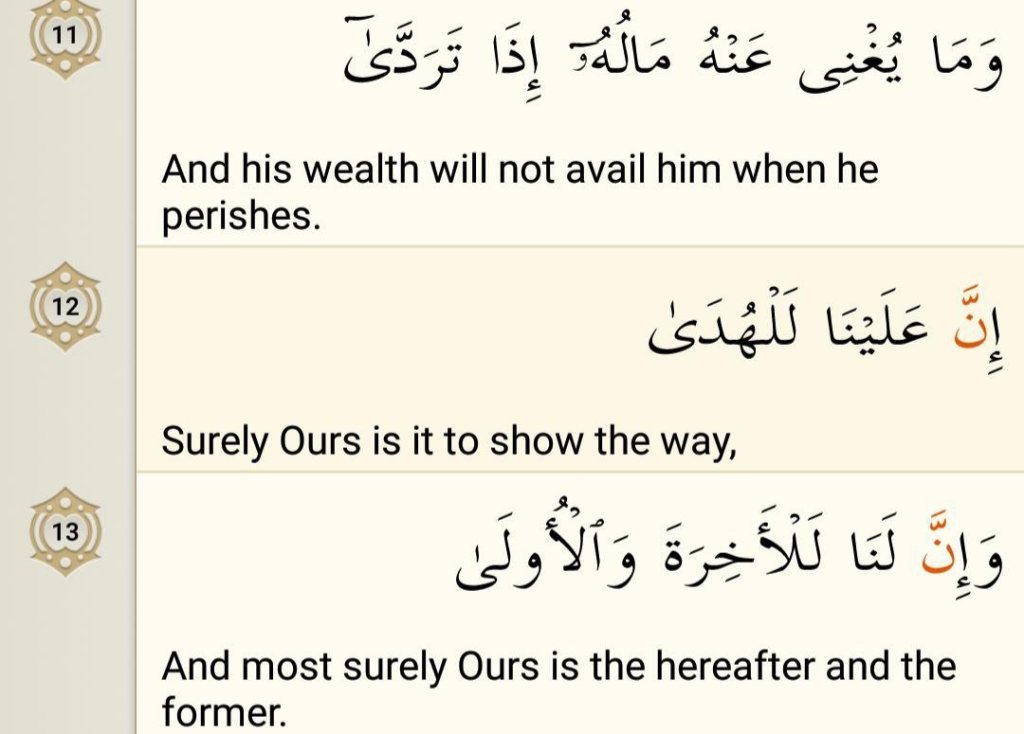
Now Allah continues for a person who’s striving is in a wrong direction, that he has to die one day and leave behind in the world whatever he had amassed for his ease and enjoyment. If he did not send money forward something for the Hereafter, what would this wealth avail him? The word taradda is to throw yourself into a ditch or off a cliff. The ditches of evil deeds are the grave and the hellfire and this person’s wealth will not help him when he is thrown into them.
Then Allah says it is Allah who guides actually! True guidance is only that which leads to Allah and secondly that it is only upon Allah to guide and to clarify the path of guidance. Of course, it was Allah who guided man even before revelation by giving him a sense of what is right and what is wrong. So, we have the pre-programmed guidance inside us and then also revealed guidance from Allah on top. Furthermore, if you are seeking guidance then the ultimate goal and conclusion of that guidance must be Allah Himself.
Then Allah says that both this world and the Hereafter are in any case under Our sovereignty, whether you follow the way shown by Us or not. If you adopt error, you will not harm Us but only yourselves; and if you adopt the right way, you will not do any good to Us, but will do good only to yourselves. Your disobedience cannot cause any decrease in Our sovereignty and your obedience cannot cause any increase in it.
And that We alone are Master of both the worlds. If you seek the world, We alone can grant it; and if you seek the well being of the Hereafter, We alone have the power to bestow it too!
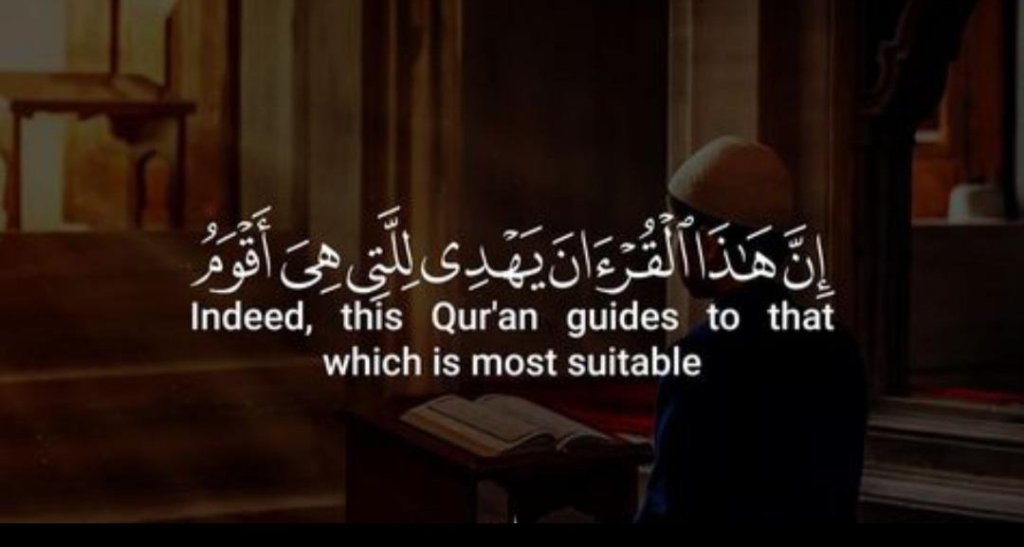
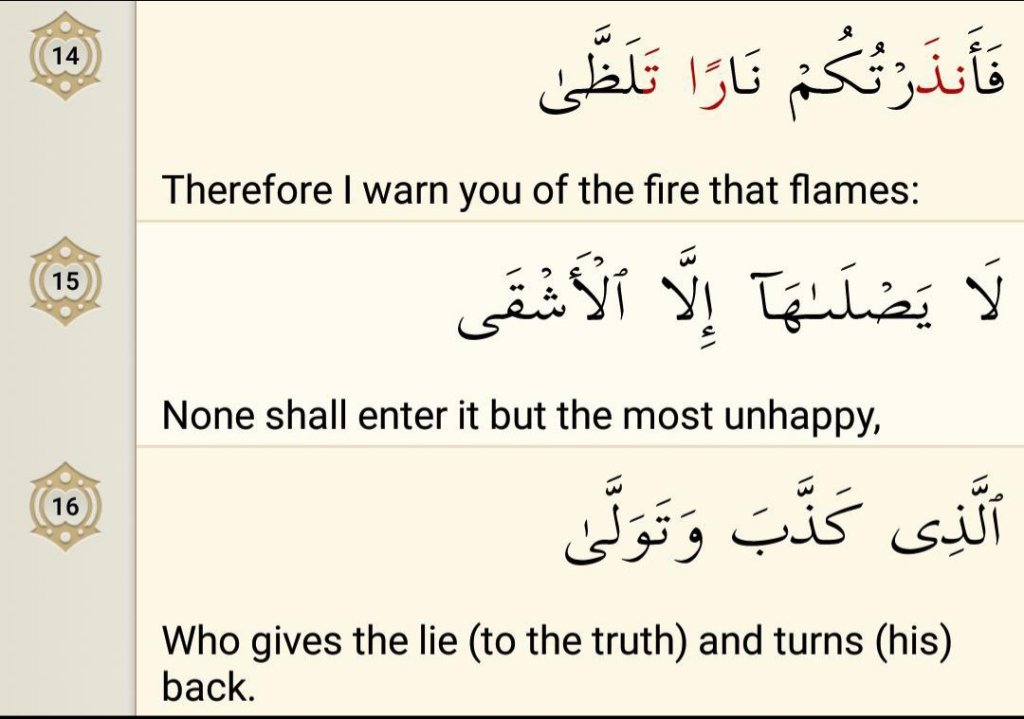
Allah here himself is giving a warning and He is not just warning people about the danger of performing a bad deed rather He is warning of the consequences also. The word taladdha is something that keeps sparking and is the kind of flame that makes a popping and crackling type of noise. The word indhaar means to sit someone down and to make them thoroughly aware of the situation they are in, as if they do not fully appreciate it’s peril, and to make them realise that there is great danger ahead of them if they continue on this path. By using this word here Allah is saying that the Quran is enough for one to fully understand the situation they are in, where they are headed and what the outcome will be. Allah is warning man about the fire using the past tense in this verse as whenever He warns about one thing specifically He uses the past tense.
The word yasla means to throw oneself in and Allah is saying that none will throw themselves into this specific fire except for the most wretched. There are other types of fire for other types of disbelievers but this fire has been specifically prepared for this specific type of disbeliever because Allah says that no one will go into it except for Al-Ashqa, the most unfortunate one, the one who turned his back to the Messenger pbuh and his Mesage, the Quran!
This most wretched and unfortunate person is the one who rejected the revelation on the inside, whilst knowing it was the truth, and turned away on the outside.

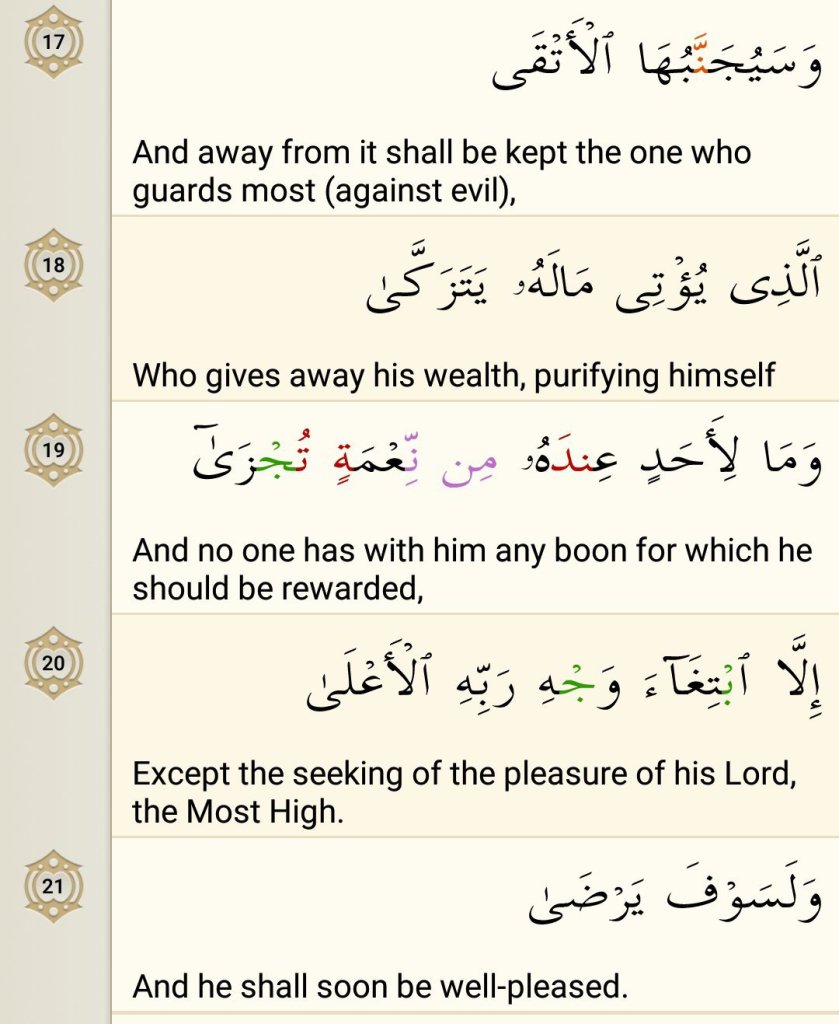
Allah says the people of taqwa will be saved from the blazing fire, who did their best guarding against evil in this life. And the most important characteristic of such a person is giving off much for sake of Allah only, and expecting nothing in return but only Allah’s pleasure. In the hope of cleansing oneself we should therefore give away our wealth and as a result Allah will clean the filth inside of us. Thus, the purpose of giving wealth is to cleanse oneself through the gift of Allah.
Such a person was not indebted in any way to the people on whom he spends his wealth so that he may be doing so in order to repay for favors received, or may be giving gifts and holding banquets to them in order to further benefit from them, but he is helping such people only in order to seek the goodwill of his Lord, the Supreme. He was neither indebted to them before, nor he expects any favors from them in the future. Its best illustration is the act of Hazrat Abu Bakr Siddiq r.a, He would purchase and set free the poor slaves and slaves-girls who accepted Islam in Makkah and were cruelly treated by their masters on that account. When Hazrat Abu Bakr’s father saw him spending money to purchase the freedom of the poor slaves and slave-girls, he said to him:
“Son, I see that you are getting the weak people free; had you spent this money on the freedom of strong, young men, they would have become your helpers and supporters.”
Hazrat Abu Bakr replied:
“Dear father, I only seek the reward that is with Allah.”
The reward for such a person is that his Lord will be well pleased with him and make him enter Jannah and that Allah soon will bless this man with so much that he will be happy!
